Best ADR Mediation & Arbitration Lawyers in Kabul
Share your needs with us, get contacted by law firms.
Free. Takes 2 min.
List of the best lawyers in Kabul, Afghanistan
About ADR Mediation & Arbitration Law in Kabul, Afghanistan
Alternative Dispute Resolution (ADR) which includes mediation and arbitration, plays a crucial role in resolving legal conflicts in Kabul, Afghanistan. These methods offer a faster and relatively cost-effective way of resolving disputes compared to traditional court litigation. Mediation involves a neutral third party who helps conflicting parties to reach a mutually agreed decision. Arbitration, on the other hand, is a more formal process where an arbitrator makes a binding decision on a dispute after reviewing the evidence provided by the parties involved. While these methods are based on traditional conflict resolution practices, they have been adapted to comply with modern legal standards.
Why You May Need a Lawyer
Legal support in ADR Mediation & Arbitration processes can provide significant value. If you’re involved in a commercial dispute, issues of property rights, business disagreements, or personal matters requiring legal intervention, it’s beneficial to have legal representation. Lawyers can clarify rights and obligations, provide advice on the best way to resolve disputes, assist in negotiation, and ensure the entire process adheres to the legal provisions of ADR in Afghanistan.
Local Laws Overview
In Kabul, the law governing ADR is embodied in the Afghan Law on Dispute Resolution Centers and Commercial Arbitration Law. These laws outline the framework for mediation and arbitration proceedings, especially for commercial disputes. They also provide a clear structure on the appointment of mediators or arbitrators, conduct of proceedings, and enforcement of decision. The Afghanistan Civil Code and the Afghanistan Civil Procedure Code also have several provisions relevant to ADR.
Frequently Asked Questions
What are the benefits of ADR in Kabul?
ADR in Kabul provides an efficient way to settle disputes without the need for lengthy court procedures. It maintains confidentiality, gives parties control over the resolution process, and tends to preserve relationships better than litigation.
Is the decision from ADR legally binding?
In mediation, decisions are not usually binding unless parties agree to make them so. Conversely, in arbitration, the arbitrator's decision is typically binding and carries the same weight as a court judgment.
Who can act as a mediator or arbitrator?
Any person, chosen by the parties involved, who is neutral and willing to assist in resolving the dispute can act as a mediator. In contrast, arbitrators tend to be designated legal professionals or experts.
Can a lawyer represent me in mediation or arbitration proceedings?
Yes, having a lawyer represent you can help protect your interests and put forward a stronger argument in both mediation and arbitration proceedings.
Are there any cost implications in the ADR process?
While ADR is generally less costly than court litigation, there can be costs associated with hiring a mediator or arbitrator, venue, lawyer fees, and administrative expenses.
Additional Resources
The Afghanistan Independent Bar Association (AIBA) is a professional organization of lawyers that can provide legal counsel. The Afghanistan Chamber of Commerce & Industries (ACCI) can also offer guidance in commercial disputes. For legal rules and regulations, you may refer to the Afghan Laws & Jurisprudence available in public libraries.
Next Steps
If you require legal assistance in ADR Mediation & Arbitration, start by consulting a local attorney experienced in the field. The lawyer will help you understand your legal standing, gather essential evidence, and guide you through the ADR process. It is recommended to ask for an estimation of costs and timeframe beforehand to manage your expectations better.
Lawzana helps you find the best lawyers and law firms in Kabul through a curated and pre-screened list of qualified legal professionals. Our platform offers rankings and detailed profiles of attorneys and law firms, allowing you to compare based on practice areas, including ADR Mediation & Arbitration , experience, and client feedback.
Each profile includes a description of the firm's areas of practice, client reviews, team members and partners, year of establishment, spoken languages, office locations, contact information, social media presence, and any published articles or resources. Most firms on our platform speak English and are experienced in both local and international legal matters.
Get a quote from top-rated law firms in Kabul, Afghanistan — quickly, securely, and without unnecessary hassle.
Disclaimer:
The information provided on this page is for general informational purposes only and does not constitute legal advice. While we strive to ensure the accuracy and relevance of the content, legal information may change over time, and interpretations of the law can vary. You should always consult with a qualified legal professional for advice specific to your situation.
We disclaim all liability for actions taken or not taken based on the content of this page. If you believe any information is incorrect or outdated, please contact us, and we will review and update it where appropriate.









